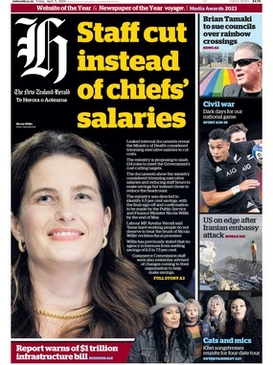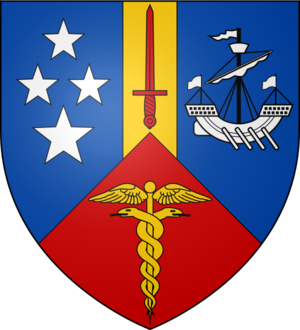The New Zealand Herald facts for kids

Front page, 5 April 2024
|
|
| Type | Daily newspaper |
|---|---|
| Format | Compact (weekdays and Sundays) Broadsheet (Saturdays) |
| Owner(s) | NZME |
| Founded | 1863 (by William Chisholm Wilson) |
| Headquarters | Auckland |
| Country | New Zealand |
| Circulation | 100,073 (as of 30 September 2019) |
| ISSN | 1170-0777 |
| OCLC number | 11123090 |
The New Zealand Herald is a major newspaper in New Zealand. It is published every day in Auckland. This newspaper is owned by New Zealand Media and Entertainment, also known as NZME. Many people consider it a very important newspaper for New Zealand.
It has the largest number of copies printed and sold in New Zealand. In 2006, over 200,000 copies were printed daily. By September 2019, about 100,073 copies were printed each day.
The Herald publishes a daily paper and a special Weekend Herald on Saturdays. There is also the Herald on Sunday, which is read by 365,000 people across the country. The Herald on Sunday is the most popular Sunday newspaper in New Zealand.
The newspaper's website, nzherald.co.nz, is very popular. It gets 2.2 million views every week. It has won the Voyager Media Awards' News Website of the Year four times in a row, from 2020 to 2023. In 2023, the Weekend Herald was named Weekly Newspaper of the Year. The Herald's mobile app also won News App of the Year.
The Herald is mainly delivered in the Auckland region. It also reaches many other parts of the North Island. This includes areas like Northland, Waikato, and Wellington.
Contents
The History of The New Zealand Herald
How The Herald Started
The New Zealand Herald was first published on November 13, 1863. It was started by William Chisholm Wilson. He used to work with John Williamson on another newspaper called The New Zealander.
Wilson decided to start his own newspaper because Auckland was growing fast. He also disagreed with Williamson about the war against the Māori people. Wilson supported the war, which the Herald called "the native rebellion." The Herald also wanted the North and South Islands to work together better.
Growing and Merging
After The New Zealander closed in 1866, another newspaper, The Daily Southern Cross, became a competitor. This paper started as The Southern Cross in 1843. It became a daily newspaper in 1862.
In 1876, the Wilson family, who owned the Herald, joined with Alfred Horton. Horton had bought The Daily Southern Cross. This led to The New Zealand Herald taking over The Daily Southern Cross.
Sharing News and Ownership Changes
In 1879, the United Press Association was created. This allowed major newspapers to share news stories. It later became the New Zealand Press Association (NZPA) in 1942. The NZPA closed in 2011.
The Wilson and Horton families owned the company, Wilson & Horton, for many years. In 1996, a company from Dublin, Ireland, bought the Horton family's share. Later, the company was bought by APN NZ. Today, The Herald is owned by New Zealand Media and Entertainment (NZME), which was formed in 2014.
In November 2012, the Herald changed its size. After this, APN News and Media made some changes to its staff.
Important Writers and Cartoonists
Many talented people have worked for The New Zealand Herald.
- Dita de Boni wrote columns for the newspaper starting in 1995.
- Gordon Minhinnick was a cartoonist for the paper from the 1930s to the 1980s.
- Malcolm Evans was a cartoonist until 2003.
- Laurence Clark was the daily political cartoonist from 1987 to 1996.
- William Berry was an editor in the 1870s.
- William Lane became editor in 1913.
Newspaper Format
For 150 years, The New Zealand Herald was printed in a large size called broadsheet. On September 10, 2012, the weekday editions changed to a smaller, more compact size. The Weekend Herald still uses the larger broadsheet format.
The Herald's Viewpoint
The Herald is generally seen as a centre-right newspaper. This means its opinions often lean towards conservative ideas. It was sometimes called "Granny Herald" in the past.
Different Editions of The Herald
The Weekend Herald
In 1998, The Weekend Herald was created as a separate Saturday newspaper. This was also the year the newspaper's website was launched.
Herald on Sunday
The Herald on Sunday is a compact-sized Sunday newspaper. It was first published on October 3, 2004. It has won Newspaper of the Year awards in 2007 and 2009. It is the most-read Sunday newspaper in New Zealand.
In 2010, the Herald on Sunday started a campaign called "Two Drinks Max." This campaign aimed to lower the legal blood alcohol limit for driving in New Zealand.
Herald Online Website
The newspaper's online news service started in 1998. It was first called Herald Online. The website was updated in 2006 and again in 2012. It has won awards for being a top news website. In 2019, the website added a paywall for some of its "premium content." This means you need to pay to read certain articles.
Newspaper Editors
- Managing editor: Murray Kirkness
- Weekends editor: Stuart Dye
Regular Writers
- Deborah Coddington, for Herald on Sunday
- Matt McCarten, for Herald on Sunday
- Brian Rudman
- Colin James was a past writer
The Herald's Coat of Arms
See also
 In Spanish: The New Zealand Herald para niños
In Spanish: The New Zealand Herald para niños



